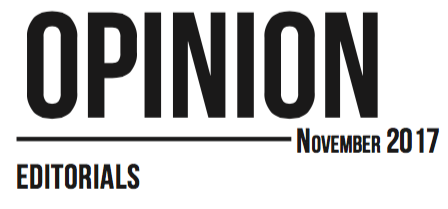OPINION: Modesty isn’t the issue when poor women need assistance

November 15, 2017
Two weeks ago, senior Sarina Finn — standing on the corner of Pico and Robertson outside Walgreens — collected 4,704 tampons and pads for women in need. Not only was this charity innovative, but it was extremely important, as low-income women all over Los Angeles have a real difficulty maintaining their health and dignity every month during their periods.
Sarina’s primary goal was to help these women in a practical way, and she was also interested in de-stigmatizing the period. A woman will spend roughly 6.25 years of her life on her period, which is normal, necessary and healthy. Yet it seems as if it still seen as a shameful, private experience.
When Sarina asked if she could hold what she called “The Drive” at Shalhevet, she was told by Dr. Weissman that school was not the appropriate place for it because periods are private, and as a Jewish institution we must approach this topic in a tzanua, or modest, manner. He suggested Sarina hold a drive for all types of necessities and include a bin for “feminine hygiene” — which would have missed the point.
He also worried about the maturity of students at school who would encounter the drive. But such immaturity is exactly why there should be talk about periods. Shalhevet upperclassmen would show an example to the younger students of how to be appropriate and respectful.
Periods are a sign of a healthy woman; if a woman does not get her period, there is concern. They are a natural part of life and women should not be shamed for it. Guys saying, “Is it that time of the month?” or people ignoring the issue of homeless women getting their periods on the streets needs to be spoken about so it can stop. We would never tell someone to not raise awareness for an illness. So why would we silence someone who wants to bring attention to something that is normal and healthy?
Sarina’s drive did not even have the word “period” in it; it was just titled The Drive. But if she had chosen to have that word in the name it would make perfect sense. If the point was to help women who are embarrassed to share their struggle because of the sensitivity of the topic, then desensitizing people to the word will ultimately help women get the supplies that they need.
There has also been an issue of religious sensitivity. This might stem from the fact that in Judaism, a woman on her period is considered tameh, or ritually impure, and must immerse herself in the mikvah afterwards before her husband may touch her.
Although this is true, the Boiling Point lives by a phrase in Leviticus Chapter 19: “Don’t be a tale bearer, [but] don’t stand idly by the blood of our neighbors, I am God.” This is extremely apt here. We must literally not stand idly by the blood of our low-income female neighbors; we must let go of our preconceived notions to spread awareness and ensure all women have what they need for this normal, God-given monthly process.
If our community can rise above this issue for the sake of charity and understand that a beautiful part of women’s biology needs to be discussed, we can begin to end the shame and difficulty that women experience on their period.
Period.
This story won Honorable Mention in NSPA’s 2018 Story of the Year in the Editorial category. It was written by Aidel Townsley.













Stuart Townsley, Los Angeles • Oct 15, 2018 at 4:21 pm
Amazingly well written and well thought out.
BarbaraSelsky • Dec 19, 2017 at 10:37 pm
I find this article to be a beautiful, well written, and passionate plea for the needs of poor women to be met. The tpe of modesty asked for by the school seems to me to be irrelevant to the cause.